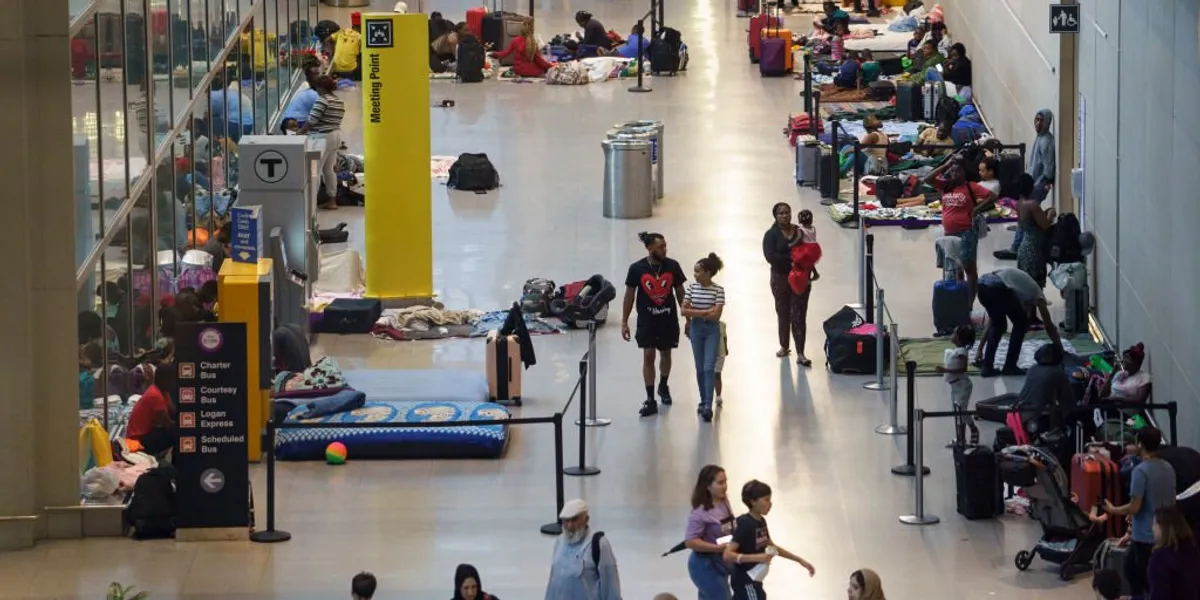The ongoing migrant crisis in Springfield, Ohio, has sparked tension between local residents and Haitian immigrants, tensions that local police attribute to government mismanagement. Tremont City Police Chief Chad Duncan has publicly expressed his concerns, criticizing both local and federal authorities for their failure to properly integrate Haitian nationals into the community before the significant influx of new arrivals.
In an interview with Blaze News, Duncan explained that the government’s mishandling of the situation has created unnecessary friction. He noted that while Springfield residents are not against the migrants themselves, the lack of preparation and resources for their integration has led to a series of issues, especially related to housing, traffic safety, and social tension.
“It’s not good for either side, and that’s a shame,” Duncan remarked, echoing frustrations expressed by many in the community. He emphasized that the real problem lies in the government’s failure to assimilate the immigrants into the local culture, making life difficult for both Springfield residents and the newly arrived Haitian nationals.
Former journalist Bill Monaghan also voiced his concerns to Blaze News, stating that many locals feel silenced by the fear of being labeled intolerant or racist if they speak out about the issues. “Being ignored and being called racist is, I think, a big part of the reason why people are concerned about talking,” Monaghan said.
This fear of speaking out, he explained, has exacerbated the crisis, as residents feel their legitimate concerns—such as the lack of housing and the rise in traffic accidents caused by unlicensed drivers—are being dismissed or painted as racially motivated.
Duncan confirmed that the effects of Springfield’s mismanagement are now being felt in surrounding towns, including Tremont City, where he serves as police chief. He pointed to the increase in reckless driving and traffic accidents involving unlicensed Haitian drivers as a significant issue that Springfield has failed to address.
One of the key concerns Duncan highlighted was the increase in traffic accidents, many of which involve unlicensed drivers. In some cases, Springfield authorities are not taking appropriate measures to address the problem. Duncan revealed that while Tremont City police are towing vehicles driven by unlicensed individuals in an attempt to prevent accidents, Springfield has been more lenient, failing to cite or tow vehicles involved in crashes.
“The impact is that people who shouldn’t be driving are out there, and they’re allowing them to drive,” Duncan told Blaze News. He expressed frustration at the lack of enforcement, explaining that some of the individuals involved in accidents are not even cited for driving without a license. This has led to rising insurance rates in the area, putting a financial burden on local residents.
“People are losing their lives. I mean, it’s a big impact,” Duncan said, referring to the increase in traffic-related deaths. He shared an example of an unlicensed driver he pulled over twice in a two-week period for speeding through town. Duncan stressed that towing vehicles and hitting drivers “in the pocketbook” is one of the only ways to deter unsafe driving.
Duncan also raised concerns about the government’s Temporary Protected Status (TPS) program, which grants legal protection to certain immigrants. Under this program, individuals can be deported if they are convicted of two misdemeanors. Duncan questioned whether the lack of enforcement in Springfield could lead to unlicensed drivers accumulating multiple misdemeanors without facing any real consequences.
Further complicating matters, Duncan stated that Springfield’s police department had recently encrypted their radio frequency, preventing outside municipalities from listening in. This decision, which Duncan speculates was made to limit criticism, has had dangerous consequences. Without access to Springfield’s radio transmissions, nearby towns like Tremont City are left in the dark when high-speed chases or other emergencies cross into their jurisdiction.
“That makes a huge impact for us,” Duncan explained, noting that these chases can endanger residents in his town, where speed limits are low, and children frequently walk along the streets.
According to Duncan, all of these issues could have been avoided if the government had taken the necessary steps to properly integrate the Haitian migrants before placing them in Springfield. He argued that placing the migrants in a centralized location, where they could learn English, driving skills, and job training, would have eased the burden on the community.
“There was an alternative way that would have been beneficial to everybody involved,” Duncan said. He added that many residents are empathetic toward the Haitian migrants and understand their desire to flee a country in turmoil. “Anybody that has a heart, that has any empathy, has any intelligence, when your home country is the way Haiti is right now, you want to get out.”
Duncan’s frustration stems not from opposition to the migrants themselves, but from the government’s failure to provide the resources necessary to help them adjust to life in the U.S. “If they had taken the time, instead of worrying about the elites lining their pockets, and just took the time, this could have went so much smoother,” he lamented.
Despite the challenges, Duncan shared a recent encounter with a young Haitian woman he had pulled over. After explaining that his frustration was with the government, not the migrants, she broke down in tears, telling Duncan she had thought the community hated her.
“We kind of built a little bridge there, and that’s what it’s all about,” Duncan said, emphasizing the importance of understanding and empathy on both sides of the issue. However, without proper government action, he fears the situation will only worsen. “The end result is, we’re just going to constantly have turmoil because they haven’t adjusted to our culture. It’s not good for either side, and that’s a shame.”

